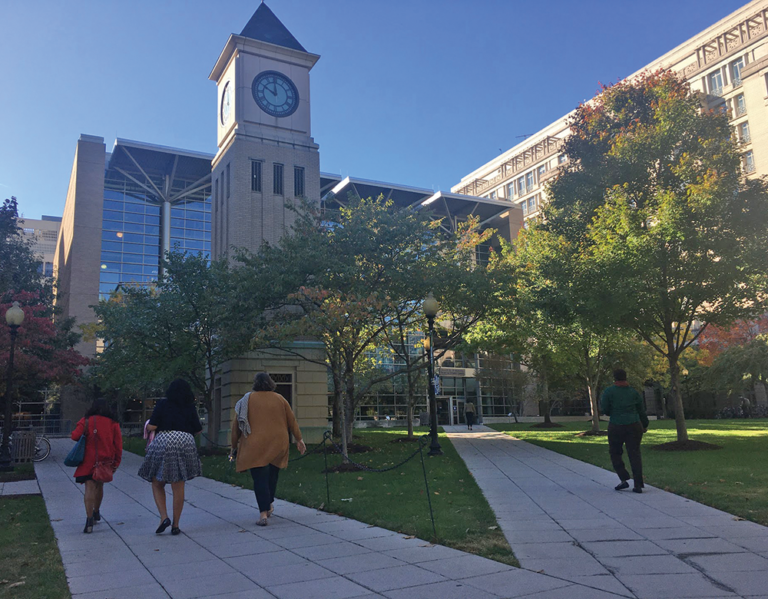Professors at the Georgetown University Law Center compiled fact sheets about how to counteract private militias’ ability to perpetrate domestic terrorism during the Nov. 3 election, as well as a sheet about how to recognize and prevent voter intimidation in general.

The Law Center’s Institute for Constitutional Advocacy and Protection released the private militia fact sheets for all 50 states and a general fact sheet on voter intimidation Sept. 22. Specifically, the fact sheets detail the laws each state has in place against the presence of private militias at polling stations. The pamphlets also provide actions voters can take if they encounter someone at their polling place engaging in militia activity to intimidate voters.
ICAP hopes to provide clear resources for election officials and help voters understand the gravity of militia groups’ presence at the polls, according to Mary McCord, legal director of the ICAP and a visiting professor at the Law Center.
“We’re just trying to help local and state authorities understand what kind of public safety measures they can take while still preserving First and Second Amendment rights,” McCord said at a media event. “So it’s something that law enforcement and state and local officials and just community members need to take seriously.”
In all 50 states, it is illegal for someone to be part of a militia not organized or controlled by a state or federal government, according to the fact sheets. Despite this prohibition, the United States has seen a drastic uptick in private militia activity in the past year, especially during the protests that occurred across the United States following the deaths of George Floyd, Breonna Taylor and others, according to McCord.
There are still several misconceptions around private militias at polling locations around the United States, including the idea that private militias are protected by the Second Amendment.
By dispelling common misconceptions about private militias at polls, ICAP hopes voters feel safer with their ability to cast a ballot, according to Joshua Geltzer, the executive director of ICAP and a visiting professor at the Law Center.
“Our hope at ICAP is that these fact sheets undermine myths that have, unfortunately, taken root in some segments of the country that unsanctioned, unaccountable, private militia activity is lawful,” Geltzer wrote in an email to The Hoya. “We hope empowering voters, activists, and law enforcement with these fact sheets allows Americans to vote in confidence knowing that unlawful militia activity shouldn’t arise in the first place and, if it does, can be stopped.”
In addition to information about state prohibitions on unregulated militias and voter intimidation, each fact sheet contains advice for voters about what to do if they witness militia activity or experience intimidation on Election Day. Specifically, voters should document what they see and report their findings to a nonpartisan hotline, such as 866-OUR-VOTE, that monitors the election for irregularities and violation of voter intimidation laws.
Since creating the fact sheets, McCord and the rest of ICAP have worked with elected officials at the state and local levels to help prepare them to handle the anticipated voter suppression efforts from militia groups.
McCord said election officials on all levels have spoken with her about her findings and have been receptive to suggestions to guard against private militias at the polls.
“So in the last couple of weeks, myself and others at my organization have addressed groups like the U.S. Conference of Mayors, the major city police chiefs, various different groups of district attorneys, other groups of mayors and other groups of attorneys general,” McCord said. “We’ve seen more and more officials at various levels putting out strong statements against voter intimidation and also urging vigilance against armed voter intimidation.”
In addition to the fact sheets regarding private militias, ICAP released a general voter intimidation fact sheet, which explains efforts that can be taken to prevent voter intimidation. On Oct. 21, ICAP also released a fact sheet for law enforcement providing guidance on how to curtail private militia activity outside of polling places, according to McCord.
All sets of the fact sheets were created in collaboration with the law firms Akin Gump Strauss Hauer & Feld, O’Melveny & Myers, and Jones Day, which offered pro bono assistance to the Law Center.
By publishing and spreading reliable information, ICAP hopes to diminish the deleterious effect militias could have on the electoral process this November, according to McCord.
“Many local and state officials are preparing by making sure that people in their jurisdictions understand the laws, and we’re trying to support that work. In support of that work, we are in the midst of producing another type of fact sheet,” McCord said. “We want to provide that guidance because it’s very disruptive to have arrests around polling places. It also can be intimidating and disruptive to have a major law enforcement presence around voting places.”




















